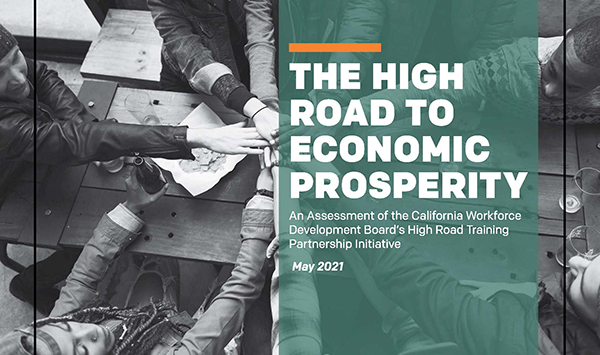Today our workforce development team released a new report, The High Road to Economic Prosperity, which offers a macro analysis of the California Workforce Development Board’s (CWDB) High Road Training Partnership (HRTP) initiative. The report defines the HRTP model and evaluates the successes and challenges of adopting the high road approach, including recommendations on how to strengthen the HRTP framework and model as the initiative expands.
California has one of the world’s largest economies, but systemic barriers prevent many Californians, particularly workers of color, from achieving economic prosperity. California’s level of income disparity has grown significantly in the past four decades and exceeds all but five states.
In 2017, CWDB launched the HRTP initiative, which fosters partnerships between industries, employers, labor, and workers to advance a just economy, with a focus on equity, climate resilience, and job quality (ECJ) principles. This was in line with the CWDB’s aim to create opportunities for economic prosperity for workers who face barriers to employment, are underemployed, and who earn low wages with limited or no opportunities for upward mobility, as well as for employers producing quality products and services through innovation and investment in workers’ skills and growth.
The HRTP initiative focuses on eight partnerships in a range of industries: healthcare, hospitality, transit, freight, water and wastewater, building operations, public sector, and transportation, distribution and logistics.
Among other findings, the report notes:
HRTPs offer a more inclusive definition of industry leadership and build collective power.
HRTPs bring together employers, labor, and community actors to look at their industries from a bird’s eye view and use their collective expertise to find mutually beneficial industry solutions.
This values-based approach prioritizes underlying systemic issues like racial inequality.
HRTPs move beyond diversity initiatives by identifying racial inequalities and creating tailored workforce development interventions, including sustainable long term policies that can be widely adopted to address the needs of disadvantaged communities.
The initiative offers an innovative model for public programs that are responsive to change.
HRTPs are continuously experimenting, learning, and refining their interventions, which allows them to respond to external shifts, such as economic downturns and climate change, in real time and work toward solutions that meet the needs of firms, workers, and communities.
The HRTP approach advances a shift in measuring workforce development success.
Traditional workforce development metrics often measure success by the number — not quality — of job placements. HRTPs also associate success with promoting worker voice and power, systems change, culture shifts, and other qualitatively measured indicators of high road success.
The initiative was supported by the Innovation and Implementation Network, an advisory and working group that included COWS (formerly the Center on Wisconsin Strategy), the California Labor Federation, the UCLA Labor Center, the UC Berkeley Labor Center, and a team of consultants. The workforce development team from the UCLA Labor Center led the process evaluation. Our Project Manager, Ana Luz González-Vásquez, presented the key findings and recommendations of her team at the The California Workforce Development Board’s High Road Summit on Friday, April 30.
Access the full report here: bit.ly/HighRoad2021



